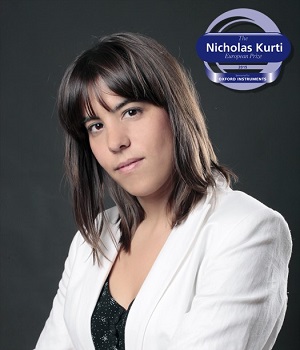Oxford Instruments is delighted to announce the winner of the 2015 Nicholas Kurti Science Prize for Europe as Dr Isabel Guillamón, from the Condensed Matter Physics Department at the Universidad Autónoma de Madrid, Spain.

Dr Isabel Guillamón is recognised for her work on vortices in superconductors, particularly for imaging experiments made with exquisite detail covering four orders of magnitude in size, from looking on the spectroscopy of vortex cores at atomic scale, to viewing thousands of vortices at micron scale.
"I am very honoured to receive this prestigious prize. I am grateful to Oxford Instruments and the Nicholas Kurti Science Prize Committee for giving me this important opportunity and specially acknowledge their work on this initiative. This prize is very motivating and spurs me on to continue striving for academic excellence. I will work hard to live up to this great opportunity", commented Dr. Guillamón.
Dr Guillamón is an outstanding physicist. During her PhD, Guillamón set up a scanning tunnelling microscope in a dilution refrigerator and produced results of the highest experimental quality. She made experiments in superconducting thin films grown by focused ion beam and in single crystalline superconductors of only a few tens of microns. She has pioneered microscopy of vortices with atomic resolution showing the influence of charge density waves in the properties of vortex cores. She also directly visualised the melting of a two dimensional vortex lattice, finding that melting is characterised by intermediate phases, a hexatic phase with free dislocations and an anisotropic smectic phase. She tested the transition theory of Berezinskii, Kosterlitz, Thouless, Nelson, Halperin and Young.
During her post-doctoral stay at the University of Bristol, UK, she worked at the high magnetic field facilities of LNCMI (Toulouse, France), HZDR-HLD (Dresden, Germany) and NHMFL (Tallahassee, FL, USA), and studied quantum oscillations in pnictide materials and the prototype two-gap superconductor MgB2. In her recent Nature Physics paper, her work deals with fundamental properties of low dimensional systems. Guillamón studied a two-dimensional vortex lattice embedded in a nanofabricated one-dimensional modulation. Both are incommensurate above a certain magnetic field. Viewing thousands of vortices, she has shown that symmetry breaking modifies zero temperature criticality. She determined the critical exponents of the transition, and showed experimentally the features of scale invariant disorder. Her latest project in Madrid combines direct observation of electronic properties together with quantum oscillations, using a scanning tunnelling microscope. She will directly image how correlations lead to Cooper pair formation and open new avenues of imaging vortices and other systems at high magnetic fields.
Dr Guillamón will be presented with the prize trophy at a future science conference in Europe, where she will present her research work.
The Nicholas Kurti Science Prize selection committee was very pleased to recognize her relentless effort to gain detailed understanding, and exhibit outstanding scientific skills in experimental physics. The committee consists of leading European physicists and is chaired by Professor George Pickett, Lancaster University, UK.
The objective of the Prize is to promote and recognise the novel work of young scientists working in the fields of low temperatures, high magnetic fields and surface science in Europe. Oxford Instruments is aware that there is a critical and often difficult stage for many between completing their PhD and gaining a permanent research position. The company therefore would like to help individuals who are producing innovative work, by offering assistance both financially and promoting their research work through a series of sponsorship programs.
More information on all the Science Prizes, sponsored by Oxford Instruments can be found at: www.oxford-instruments.com/scienceprize
The previous winners of the Nicholas Kurti Science Prize are Dr Alexander Ako Khajetoorians, Dr Lapo Bogani, Dr Ronald Hanson, Professor Mathias Kläui, Dr Christian Rüegg, Dr John Morton, Professor Lieven Vandersypen, Professor Kostya Novoselov, Professor Andreas Wallraff and Dr Silvano De Franceschi.